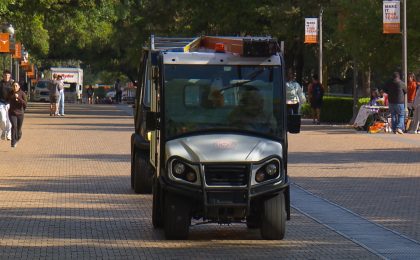
The University of Texas at Austin is leading the way in sustainable practices with its fleet of low-speed electric vehicles (LSVs). These LSVs are a critical part of the university’s support fleet, with more than half of the vehicles being electric.
From three-wheeled electric carts used by parking enforcement officers to versatile vehicles that can transport people, equipment, and cargo around campus, these LSVs play a vital role in keeping the university running smoothly. According to Michael E. Marotta, a parking enforcement officer at UT, the maneuverability of the electric carts is a game-changer, allowing them to navigate narrow streets with ease.
Mark Kaligian, an advocate for EVs at UT, highlights the various departments on campus that benefit from using LSVs. The landscapers appreciate the ability to access work sites easily, while the custodial staff finds it convenient to bring cleaning equipment directly to the buildings. Additionally, the university’s sustainability efforts align with using LSVs, as they contribute to a more environmentally friendly campus.
The University of Texas has embraced alternative fuels for years, with a focus on low-speed electric vehicles. With on-site propane fueling, E85 for ICE vehicles, and a growing fleet of EV cars and trucks, UT is committed to reducing its carbon footprint. The university’s ability to produce its own energy efficiently has been a significant advantage for powering their EVs.
Maintenance of the LSVs is relatively straightforward, with regular upkeep such as tire changes, chassis lubrication, and occasional battery replacements every few years. Michael E. Marotta notes the longevity of the batteries, especially in the Texas climate, where they can hold a charge for several days.
In conclusion, UT’s dedication to right-sizing their fleet and incorporating sustainable practices through LSVs showcases their commitment to a greener future. With the efficiency and cost savings associated with electric vehicles, the University of Texas is setting a positive example for sustainable transportation on campuses nationwide.


